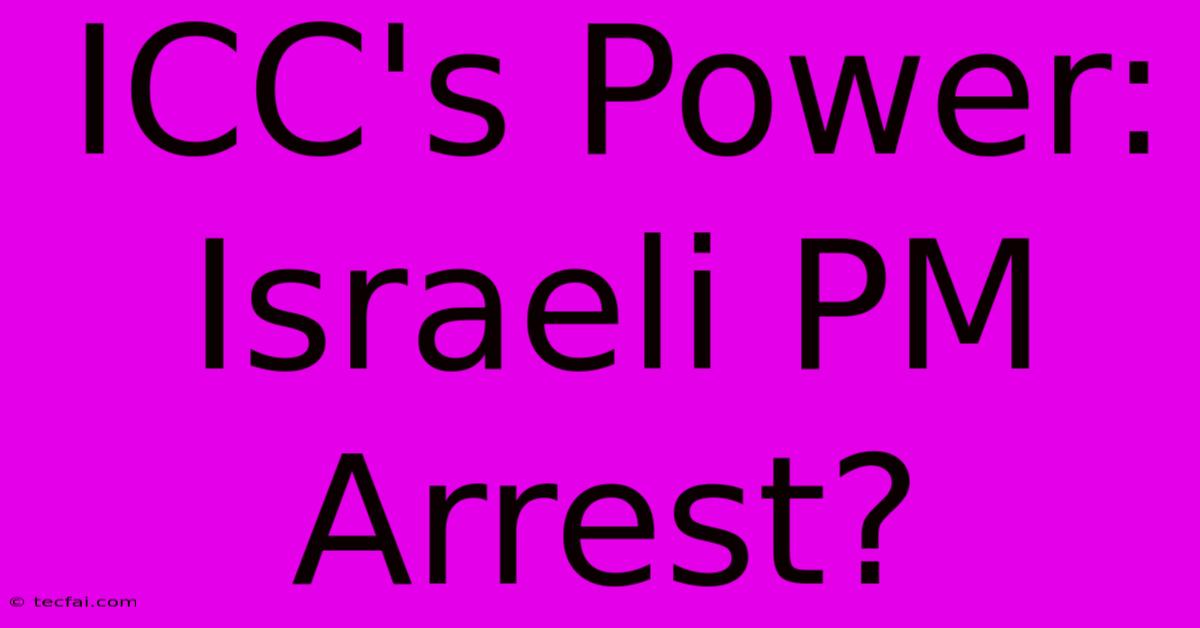ICC's Power: Israeli PM Arrest?

Discover more detailed and exciting information on our website. Click the link below to start your adventure: Visit Best Website tecfai.com. Don't miss out!
Table of Contents
ICC's Power: Can the International Criminal Court Arrest an Israeli Prime Minister?
The International Criminal Court (ICC) has cast a long shadow over Israeli politics, sparking intense debate about its jurisdiction and the potential implications for high-ranking officials. The recent developments, and the possibility of an Israeli Prime Minister facing arrest, have brought this complex issue to the forefront of global discussions. This article delves into the ICC's power, its limitations concerning Israel, and the potential scenarios surrounding the arrest of an Israeli Prime Minister.
Understanding the ICC's Mandate
The ICC is an independent, permanent court established to investigate and prosecute individuals accused of the most serious crimes under international law: genocide, war crimes, crimes against humanity, and the crime of aggression. It's crucial to understand that the ICC doesn't have a global reach; its jurisdiction is determined by several factors.
-
State Party Consent: A state must be a member of the Rome Statute, the treaty that established the ICC, for the court to exercise jurisdiction over crimes committed on its territory or by its nationals. Israel is not a member of the Rome Statute.
-
UN Security Council Referral: The UN Security Council can refer situations to the ICC, regardless of whether the state in question is a member. However, this option is often politically fraught, with the possibility of vetoes from permanent members hindering referrals.
-
Acceptance of Jurisdiction: Even without being a state party, a state can accept the ICC's jurisdiction on a case-by-case basis.
The ICC and Israel: A Complex Relationship
Israel's non-membership in the Rome Statute significantly complicates the ICC's ability to investigate alleged crimes committed within its territory or by its citizens. The ICC's chief prosecutor has asserted jurisdiction based on the principle of universal jurisdiction and the Palestine’s declaration of acceptance of the ICC's jurisdiction. This claim remains highly controversial and is fiercely contested by Israel, which argues that the ICC lacks the authority to investigate its actions.
The Hypothetical Arrest of an Israeli Prime Minister
The question of whether the ICC could arrest an Israeli Prime Minister is highly nuanced and depends on several intertwined factors. While the ICC could issue an arrest warrant, enforcing that warrant presents substantial challenges.
-
Lack of Enforcement Power: The ICC doesn't have its own police force or army. It relies on the cooperation of member states to arrest and transfer suspects to The Hague.
-
National Sovereignty: Israel, as a sovereign nation, is highly unlikely to cooperate with an arrest warrant issued by the ICC, especially one targeting a sitting Prime Minister. Such an action would be seen by many as an infringement on its national sovereignty.
-
Political Ramifications: An attempt to arrest an Israeli Prime Minister would have far-reaching political consequences, potentially escalating regional tensions and creating international diplomatic crises.
Potential Scenarios and Outcomes
Several scenarios are possible:
-
No Arrest: The most likely scenario is that the ICC issues a warrant, but Israel refuses to cooperate, rendering the warrant effectively unenforceable.
-
International Pressure: International pressure could be brought to bear on Israel, but the effectiveness of such pressure is uncertain. The political will of other nations to confront Israel on this issue could be limited.
-
Indirect Enforcement: The ICC might attempt indirect enforcement by leveraging sanctions or other measures against individuals or entities associated with the alleged crimes.
-
Legal Challenges: The legality of the ICC's actions would likely face significant legal challenges, both within the ICC and in international courts.
Conclusion: A High-Stakes Legal and Political Battle
The potential for the ICC to arrest an Israeli Prime Minister is a complex and high-stakes issue. It highlights the tension between the international rule of law and national sovereignty. The outcome will depend not only on legal interpretations but also on the political will of various actors, both within and outside Israel. The ongoing debate will continue to shape the discourse surrounding international justice and the relationship between the ICC and states, particularly those outside its formal jurisdiction. The situation remains fluid and requires ongoing observation and analysis.

Thank you for visiting our website wich cover about ICC's Power: Israeli PM Arrest?. We hope the information provided has been useful to you. Feel free to contact us if you have any questions or need further assistance. See you next time and dont miss to bookmark.
Featured Posts
-
Judge Overturns Smollett Verdict
Nov 22, 2024
-
John Prescott A Lasting Impact
Nov 22, 2024
-
Rangers Fall Flames Youth Triumphs
Nov 22, 2024
-
De Generes De Rossi Reported Us Exit
Nov 22, 2024
-
Virat Kohli Dasgupta Wants Fire
Nov 22, 2024
